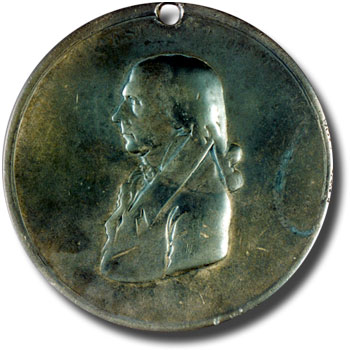 Also known as “Mr. Madison’s War”, the War of 1812 was
in fact an extension of the Napoleonic Wars then being fought in Europe.
Ever since the 1790's, Britain and France’s were pitted in a contest
for supremacy. This intensified after the rise of Napoleon Bonaparte to
include a policy both nations practiced of stopping any merchant shipping
attempting to trade with their rivals. This included the United States,
a young nation desperately needing European trade to shore up its flagging
economy. When French and British naval vessels began to stop American
ships, Jefferson and Madison vociferously complained and advocated a freedom
of the seas policy. In frustration, Jefferson even directed a series of
embargo acts that forbade trade with either Britain or France. These policies
only hurt America in the long run and resulted in the bankrupting of a
number of New England firms.
Also known as “Mr. Madison’s War”, the War of 1812 was
in fact an extension of the Napoleonic Wars then being fought in Europe.
Ever since the 1790's, Britain and France’s were pitted in a contest
for supremacy. This intensified after the rise of Napoleon Bonaparte to
include a policy both nations practiced of stopping any merchant shipping
attempting to trade with their rivals. This included the United States,
a young nation desperately needing European trade to shore up its flagging
economy. When French and British naval vessels began to stop American
ships, Jefferson and Madison vociferously complained and advocated a freedom
of the seas policy. In frustration, Jefferson even directed a series of
embargo acts that forbade trade with either Britain or France. These policies
only hurt America in the long run and resulted in the bankrupting of a
number of New England firms.
To make matters worse, the British would often remove American
merchant sailors from their vessels and press them into service
with the Royal Navy. Finally, in frustration, President Madison
issued ultimatums to both France and Britain warning that if
the practice of intercepting American shipping didn’t
stop immediately, the US would be forced to declare war. France
responded positively first, resulting in the 1812 American declaration
of war against Great Britain.
The conflict was fought over a wide geographic area, with British
troops invading the United States from Canada (and vice versa).
In addition, Washington D.C. was sacked and burned, and Baltimore’s
harbor shelled. Ultimately, the British northern and central
campaigns failed to bring the United States to her knees. Tragically,
the British tried another attack in the southern US at New Orleans.
Unknown to the British commanders at the time, the war had in
fact ended with a peace treaty signed in Europe only a few weeks
before.
America came out of the war, in early 1815, brimming with confidence
over its second victory against the British. It ushered in what
has since been known as the “Era of Good Feelings”
when American businesses began to grow, North and South were
united in spite of the growing slavery controversy, and westward
expansion took off.
Address:
612 East Boulevard Ave.
Bismarck, North Dakota 58505
Get Directions
Hours:
State Museum and Store: 8 a.m. - 5 p.m. M-F; Sat. & Sun. 10 a.m. - 5 p.m.
We are closed New Year's Day, Easter, Thanksgiving Day, and Christmas Day. We are closed at noon Christmas Eve if it falls on Mon.-Thurs. and are closed all day if it falls on Fri.-Sun.
State Archives: 8 a.m. - 4:30 p.m. M-F, except state holidays; 2nd Sat. of each month, 10 a.m. - 4:30 p.m. Appointments are recommended. To schedule an appointment, please contact us at 701.328.2091 or archives@nd.gov.
State Historical Society offices: 8 a.m. - 5 p.m. M-F, except state holidays.
Contact Us:
phone: 701.328.2666
email: history@nd.gov
Social Media:
See all social media accounts